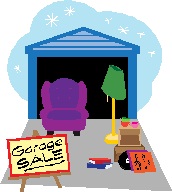1. Purchase used as opposed to new items, or items made from recycled materials. Used items, available at antique or thrift stores as well as private sales, are often very affordable and will last just as long as new materials. This is especially true of toys, lamps, and other furniture that is often thrown away because it is outgrown or not needed, rather than because it is old.
– Where in Rochester? Goodwill, Salvation Army, Second Season Clothing, Godiva’s, Art’s
Used Furniture, Volunteers of America, Play It Again Sports, Rick’s Recycled Books
2. Shop local! Support local businesses and cooperatives (co-ops), which keeps more money in the local economy, and avoid spending money at large/national chain outlets that may outsource business and profit. Smaller stores usually pay better wages and are more responsive to the local community’s concerns and needs.
– Where in Rochester? Click here to find local businesses in Rochester!
3. Go organic! Organic in the produce world means food was grown without the use of synthetic pesticides and fertilizers, and processed without additives or radiation. For animal products, it means no hormones or regular antibiotics were used, and the animal was fed organic feed. Many non-organic practices could be harmful to you, the farm workers, or the environment. Because of the price of certification many small farmers can’t afford to get USDA certified, but if they use the practices they are still organic farmers. When shopping for organic food items make sure to look for the certification “USDA Certified Organic” or ask to make sure the food was grown with organic standards.
– Where in Rochester? Lori’s Natural Foods, Natural Oasis Market & Café, most Farmers
Markets (South Wedge, Westside), and some vendors at the Public Market (always ask!).
4. Avoid excess packaging. Most items that you buy in stores are packaged not because they need to be packaged, but primarily because the packaging is a point-of-sale advertisement. Do brussel sprouts really need their own foam tray? Think of what you’ll be throwing in the landfill the moment you get your product home, and try to find items that come packed lightly.
5. Choose products that are made with sustainable materials, and avoid plastics and other petroleum-based products. Not only are they not renewable, but they use a lot of energy in the manufacturing process. Plastics are also less biodegradable than other products such as wood and most metals. While the plastics industry has improved upon the recycling of plastics in recent years, reducing production is always more efficient than recycling afterward. Try to avoid plastic and foam products you know have more sustainable alternatives, like thick paper plates over plastic. Remember, there is always a better option than plastic!
6. Buy energy efficient. When you buy something, try to see the “indirect costs,” rather than just the direct ones. Consider these two questions;
1) How much energy does it take to make a product?
2) How much energy will it take to use this product?
When you buy a car for example, you are not only signing up to use the energy and fuel it takes to fill the gas tank, but you’re also purchasing the energy used to mine the ore, make the steel, assemble and ship the car, and build the roads the car drives on. This is an example of what it really means to be aware of your energy footprint – what matters is not just how you use it, but how it was made and where it will go when you’re done with it!
Looking for Energy Star products when buying new appliances is a great first step, but remember to ask these questions before purchasing a product and you will save yourself – and the world – a lot of unnecessary cost!




This is essentially an opus of economic illiteracy